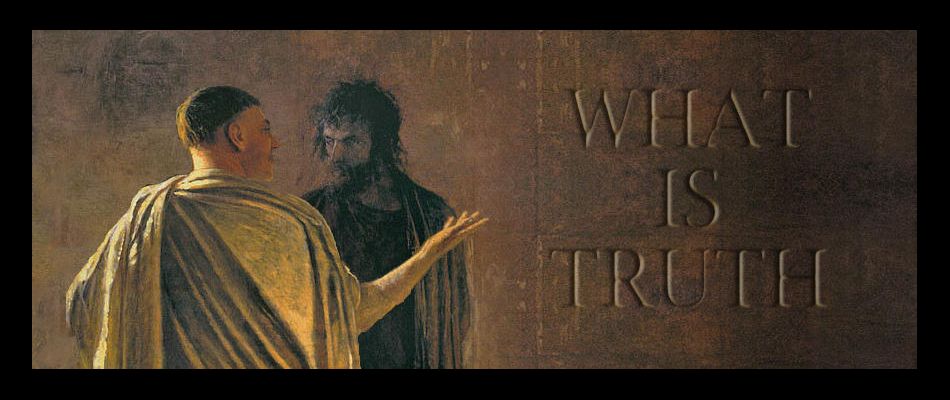
Chapter III: The quest of truth
Ecrit par logomachicus
‘All truths are easy to
understand once they are discovered, the point is to discover them,’ Galileo Galilei
From time immemorial
a battle, within the Church, has been going on between some powerful
congregations. The problem is some blind people tend to lead other blind. Even
in darkness, a blind with a torch light could hardly afford to lead another.
Friction is at the reach of hand. There will be a fierce battle between both of
them.
All the participants
in this complex battle –in the Church- are claiming supremacy in running world
events and dealing with thorny matters. On their shortlist are conspicuously
found spiritual issues, temporal share of power and un-due privileges.
For the minds
conversant with Church matters, this not so fraternal war is unofficial. So
far, no major congregation has come out to admit verily the existence of any
such contentious opposition. But over the time, this heterodox fight has
claimed many casualties over some issues of acute realism.
Nobody has ever
admitted the fact of being the champion of confusion. But the point of the
matter is about who has the monopoly over what and how does all this peculiar
in-fight affect the daily running of the Church business.
If one may use the
canonical terms, how does this situation affect the souls of the faithful? Some
traditional major congregations are involved from head to toes in this in-fight.
And that is true for
the Dominican Friars, the Poor Friars of Saint Francis of Assisi and not
uninterestingly with the Jesuits. The most involved in this show are these
three congregations. According to whom? That
is the question!
They lead the
festival of the world fair of religion due to their relevance and influence
throughout the making -or unmaking- of the church and the world history.
These Congregations
labeled as major, so far had come to limelight through their knowledge
management, their hold on information and their grip on leading world events or
their unseen and unwanted influence on key front stage actors. The major point
will be who is the lead actor? Who is having the upper hand in this ghostly battle?
Unavoidably, the
cracking of jokes makes disgruntled people less unhappy. Good to mention, many
clerics have become masters at that soul-lifting trade. A good cleric makes
funny jokes. And some crude jokes are not uncommon in a set of clerical happy
fellows. And some of these very jokes appeared even daring if not unauthorized
in such religious realms. Some pretty
ecclesiastical jokes, which may be found truly not so much far-fetched and
likely to be sizzling for the advised listener -or an inquisitive reader, or
simply to the average church observer- are about God.
The fact is the jokes are facts about God.
They deal with the problems
God faces out in his daily life and daily running of the universe. God had some
management problems over some issues pertaining to certain congregations.
Congregational
banking, pronouncements and congregational deeds seem to slip out of the hands of
God.
The first joke states
that God does not know how much money owns a poor friar of Saint Francis of
Assisi. Besides, God does not know the next move of a knight Companion; in
other words a Jesuit. Furthermore, God is afraid of the next move of the Devil
while the latter is much dreaded by the next move of a Jesuit.
It is not futile to
state that the very word Companion of Jesus is carrying, by itself, an inborn
germ of controversy.
The controversial
character of many Companions, starting from their noble founder through the
centuries and in many places, had not created conditions to ease the growing
resentment toward the Jesuits. The papal suppression ad tempus of the Society of Jesus was an early ominous sign. Are
the other religious syndicates not companions
of Jesus? Or what is this funny, otherwise rather an arrogant idea, and
probably not so funny for many critics, to hijack, so to speak, the company of
the lord. The thirteenth commandment is clear.
Thou shall not seize the exclusivity of the Lord’s company.
‘Which book?’ you are tempted to ask.
‘Mind your language!’
And over the times,
many Jesuits have brought their names forward by the divisive stands they have
taken on moral issues and some pronouncements they made. The echo of these divisive
moves is still resonant.
The moves of the
Jesuits may not be so revolutionary -Quod
erat demonstrandum. Even their speculative activities are beyond the
fathoming of God. They were credited for many controversial moves less
expected, less envisioned.
Cases of the
controversial Jesuits are legion. Not to cite but one, the great missionary
Matteo Ricci who made lasting memories in China. There, he did not hesitate
whatever the occasion avails itself to convert Chinese literati to Christianity
by making some unprecedented and most endearing moves. He gave equivalence in
Catholic faith between Eastern Chinese and Western rites. The move was
suspicious to many, the Dominicans on top. It led with much ado about nothing,
to the eponymous Ricci controversy. But compare to other Jesuits at the centers
of future controversies, Ricci is simply seen as un enfant de chœur.
As if handling issues
associated with the bank accounts of a poor Franciscan friar and managing the
next moves of a Jesuit were not enough, God had to look into issues pertaining
to the speculative trade of the members of the Ordo Praedicatorum.
That such hectic task
of God is how to follow the Dominicans in their inquisitorial quest of Truth.
It is not uncommon to meet cases of the Dominican friars with new ideas,
unquestionably the fruit of their contemplative quest for the Truth. Maybe this
effort, not always acknowledged, is made out of necessity to give a trial
answer to Pontius Pilate’s question addressed to Christ Jesus.
‘Truth? What is Truth?’
Funny as it seems,
God is believed not to know what ideas are sprouting in the head of a preaching
‘Black’ friar as people out of customs call the friar of Saint Dominic de
Guzman.
It is however
believed that the Friars preachers or firing,
if not frying, and even fraying preachers,
are good in cooking new ideas. By the yardstick of their worst critics, those
ideas are mainly considered simply bad if not inflammatory. This belief might
be wrong but who cares? That is another very urgent issue God ought to look at
without delay. Poor God!
The very idea of the
absence of knowledge attributed to God is pretty provocative if not blatantly
blasphemous. That is if one is to judge by the gory gaze of the staunch Catholics; a term fashionable and used in some social groups and
defended by all traditional catholic religious circles. Such claims, for the
fictional mind, are simply a gross outrage to the majesty of God, punishable by
hellfire. But for the minds -too- open to light, or as rightly phrased by the
unbiased spirits, liberated from the yoke of cultural conditioning and
religious autarky, it is fun giving and quite entertaining to indulge in the
exploration of the topic of an ignorant
God.
What funny idea to
talk of an ignorant God? What could be possibly funny about an ignorant God by the way? Which God are we talking
about at all? God is ignorant of
what? Maybe, -moronic bigots-, that would have been the first questions to ask
prior to feeling overly offended.
The quite idea that
God does not seem to know is very interesting. He is however not alone in that
predicament where He enjoys the notable company of the Jesuits on pulpit, the Dominicans in
pulpit and the Franciscans out of
pulpit.
A Jesuit before his
going to the pulpit does not know what he is about to say whereas a Dominican
while on pulpit does not know what he is saying.
There is therefore a
permanent fear, from the church authorities, that the audience might be perhaps
taken aback by the next move of a Jesuit. In his case, the poor friar of Saint
Francis is at loss on what he just said on leaving the pulpit. By the way if
one is not reluctant to give the Devil his due, a Poor Franciscan Friar Minor,
a Capuchin or one attached to the Convent is oblivious of what he just said on
leaving the pulpit.
From all aspects,
there is something wrong with the thought process. Some may quickly conclude
that from the elements drawn above, the leaders of the thinking, the
spear-headers of the acting or the movers and the shakers of this world are in
trouble. And their blind followers who have themselves to blame are not immune
from the troubles caused by such a dreadful situation.
There had never been
anything worse than a blind follower, unaware of the danger and uncritical of
the master staunchly supporting the ideas of the latter. And the most disheartening
is put to height by the fact that such ideas are fully unexplored and are not
well squared out by the master.
At the beginning and
at their foundation, the Franciscans labored ceaselessly to rebuild the fallen
House of God. Later on the Dominicans followed in their wake with no less zeal.
They wanted to patch up the building of God on the verge of collapse.
The Jesuits,
on the contrary, were wantonly concerned in expanding their well-furnished palace for the greater glory of God. Who shall win the race
of/for God?
The religious
congregations are the stew of the church life. According to the mood of the
time they mutually cooperate or gang up against each other. That war over
certain issues said to be key issues may be either overt or covert with each
other. As time evolved, it appears that the Poor Franciscan friars -not all
remained very poor alas. Some of them have become arrogantly wealthy. These are
more monkish and have left the front stage of the show to the fiery Friars
Preachers and to the controversial Companions of Jesus.
The buoyancy of the
latter is not disputed. And they do more often than not cover the headlines of
newspapers with the timely daring
moves, often themed controversial if not thoroughly un-churched.
Should God be in
danger one dark morning, what will happen? My main concern is about the danger
awaiting God. Verily, it looks is as if God is at security till one of the
competing syndicates takes the unthinkable wrong move, predictably the Jesuits,
unpredictably the Dominicans. You back either of the following moves and you
will surely be excommunicated with no imminent likelihood of appeal. And you lose
communion with the Church of God.
In actual fact, there
will be a grave concern, when a Poor Friar of Saint Francis will try to say
that God may have existed. Likewise if a Dominican friar suggests the near
possibility of the former’s existence in short, that God may exist. Last but
not the worst- the worst is yet to be at hand-, a Companion of Jesus may utter
the unbelievable but not the unthinkable.
That will be but the
idea not yet thought of that God is yet to exist. Hopefully you pray no such
thing will happen, lest hell goes loose.
Probably, thanks to YHWH who is GOD
things will be different. YHWH is I Am
Who I Am and because of it that will not happen. So we hope or don’t you?
But will HE be able to prevent the last move of a Jesuit?






